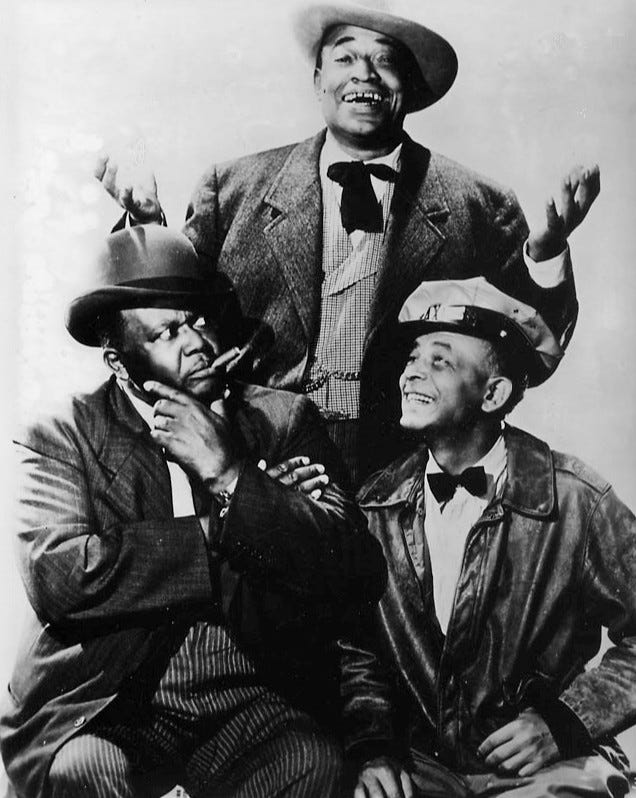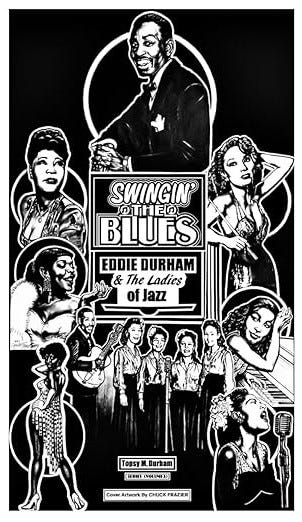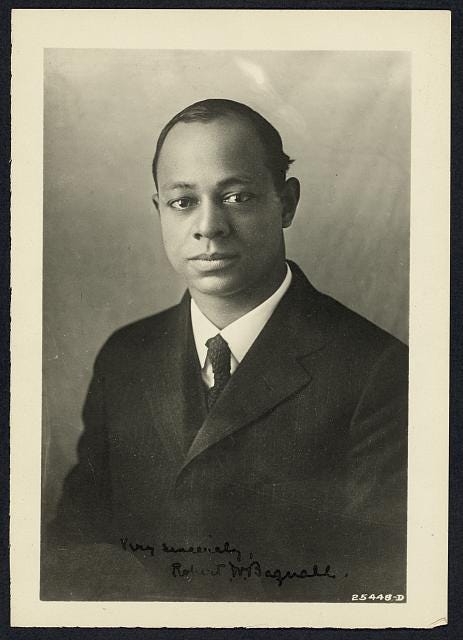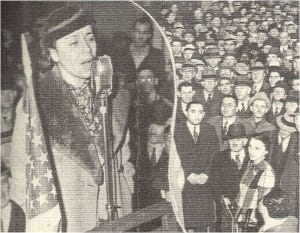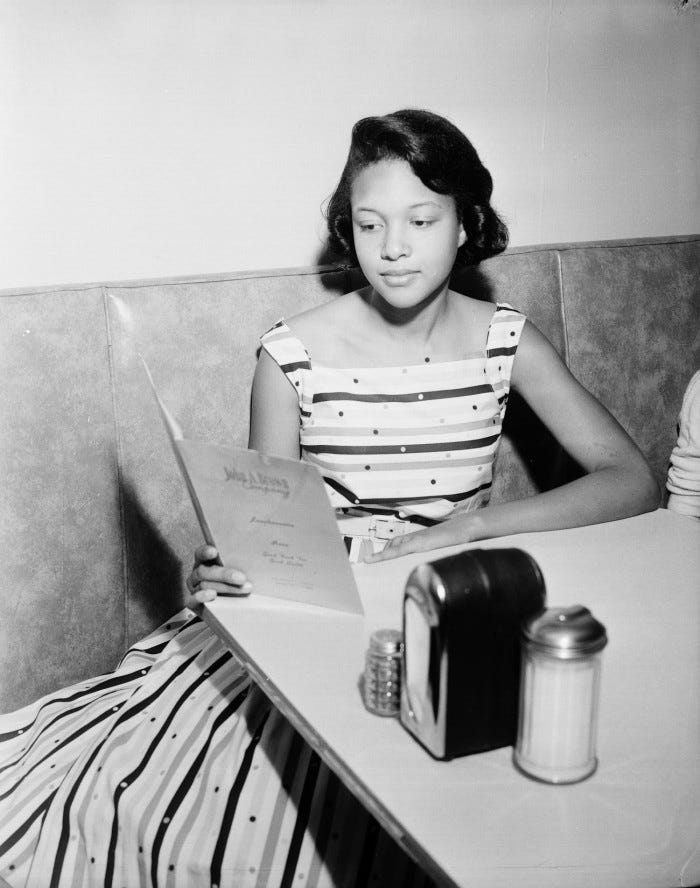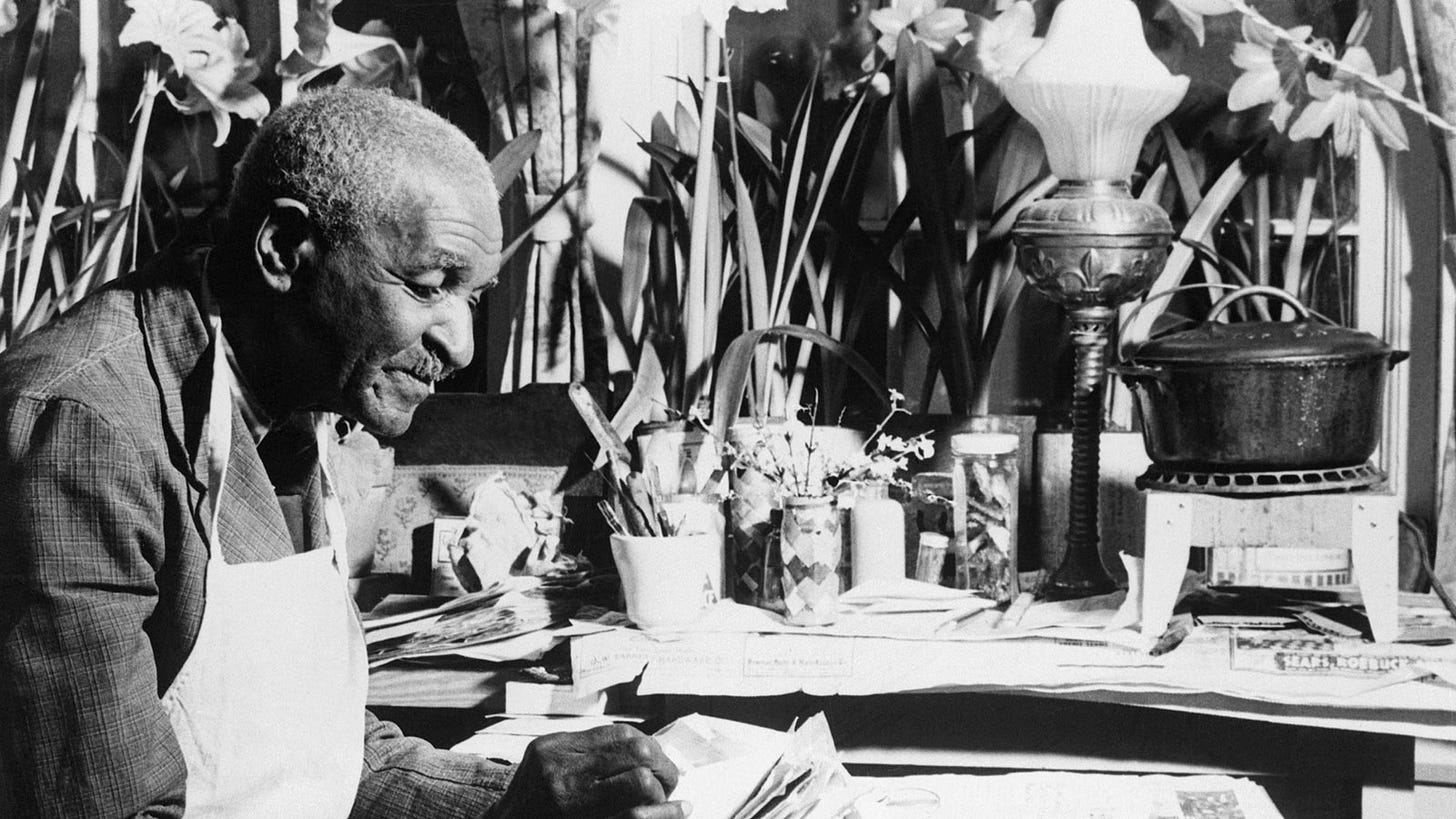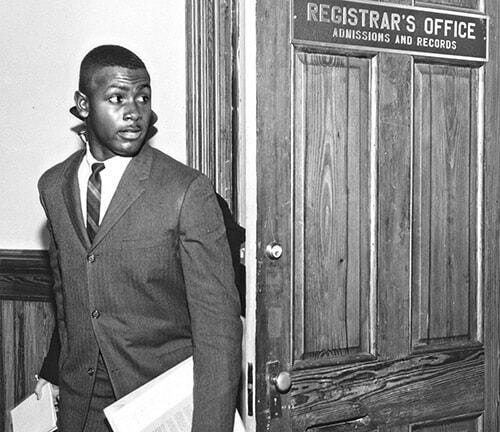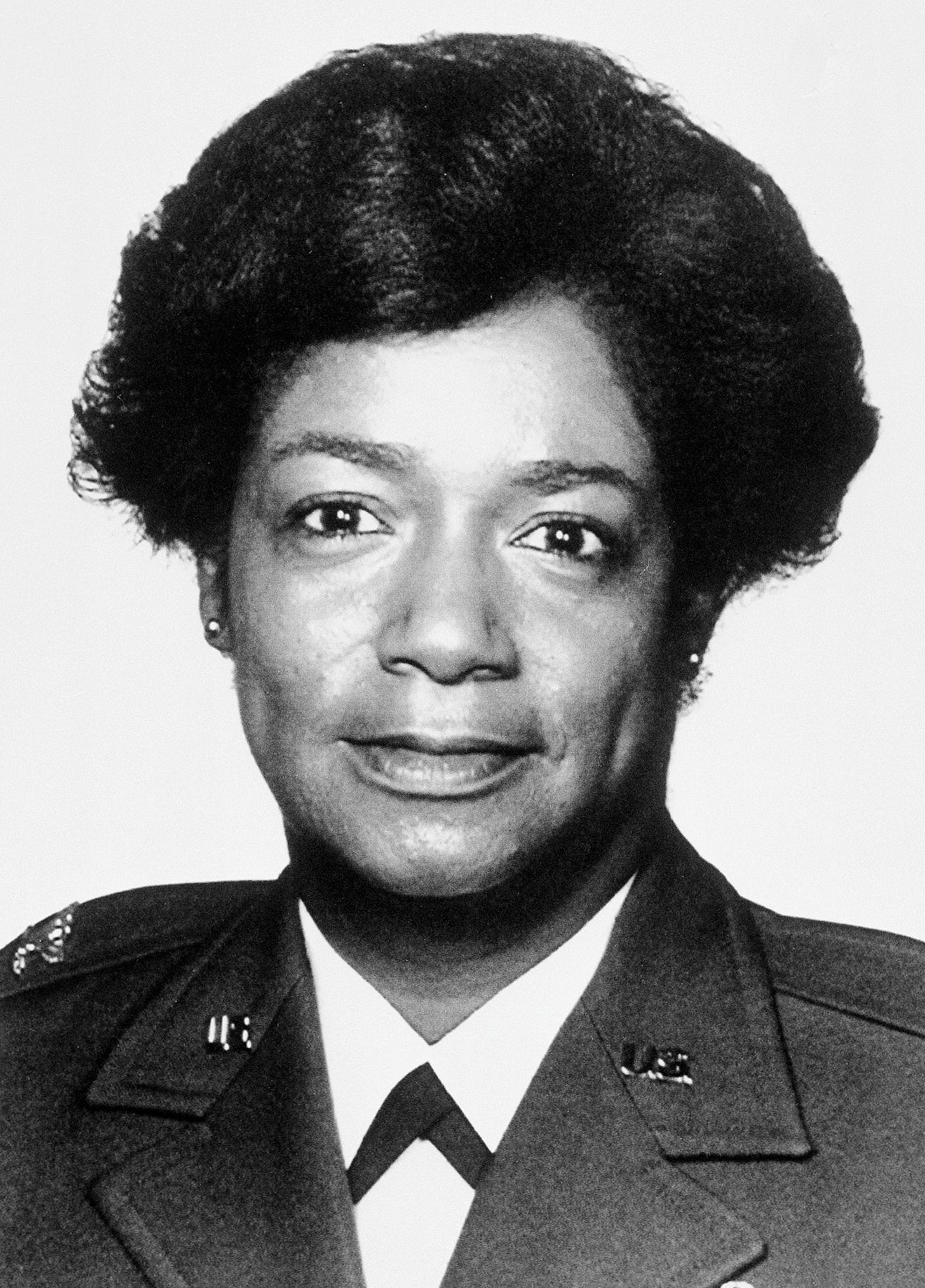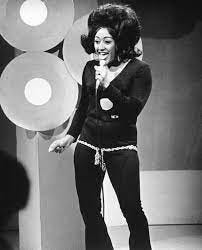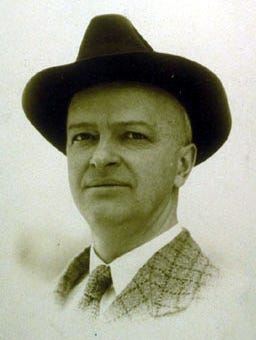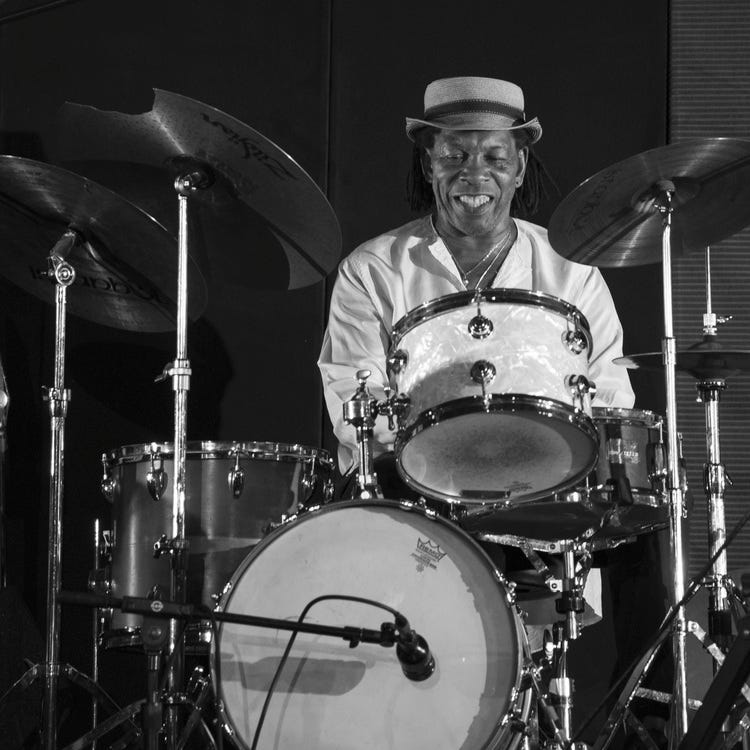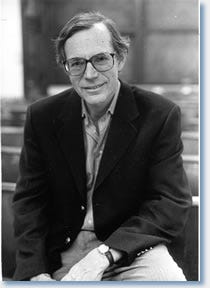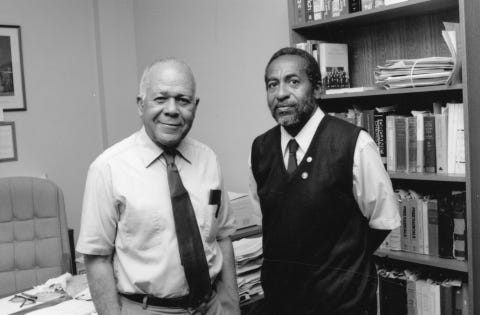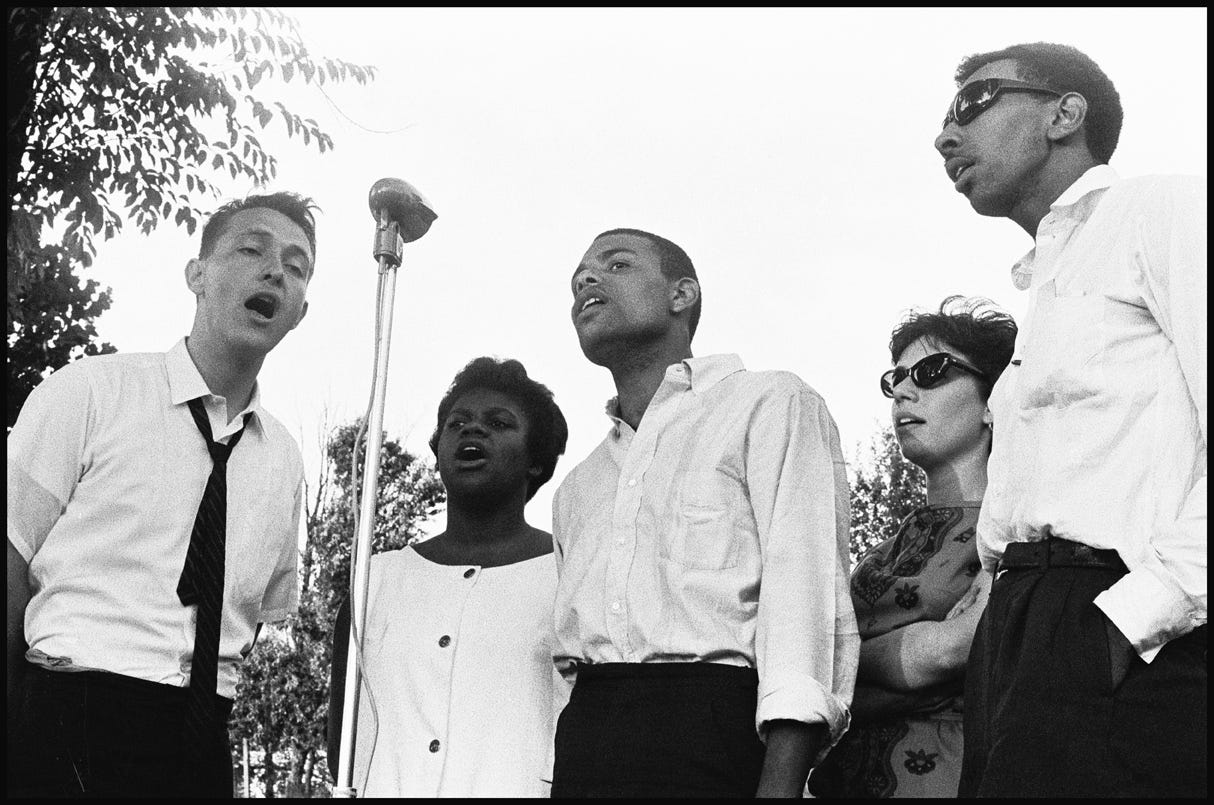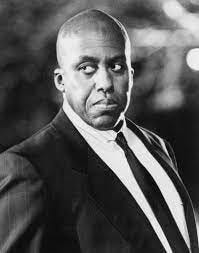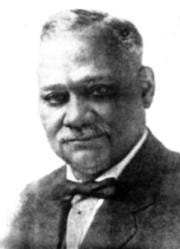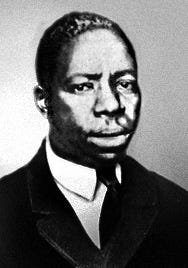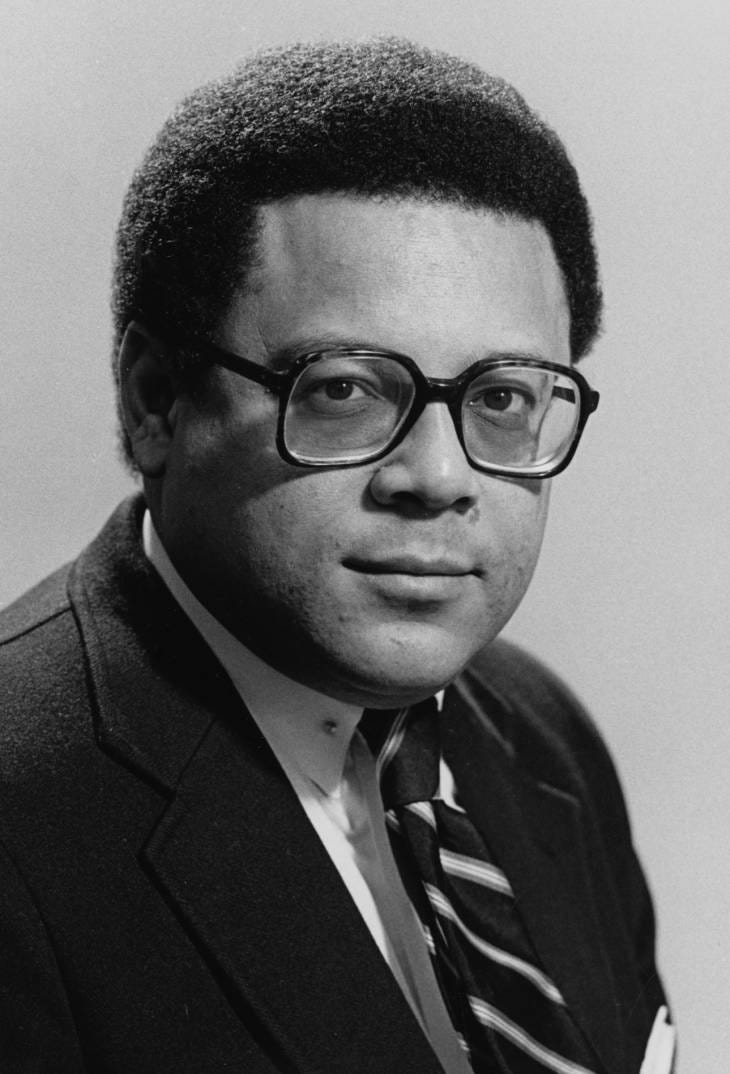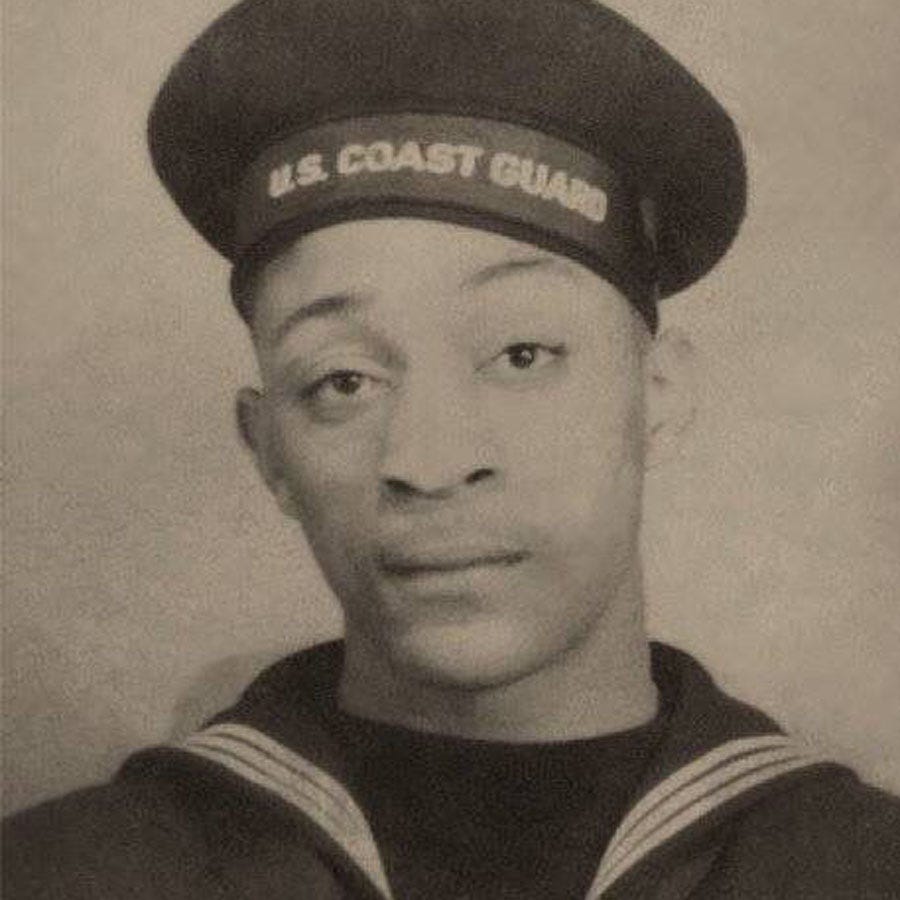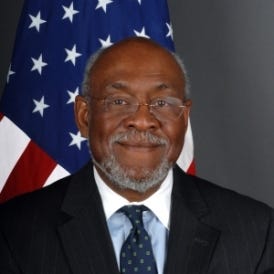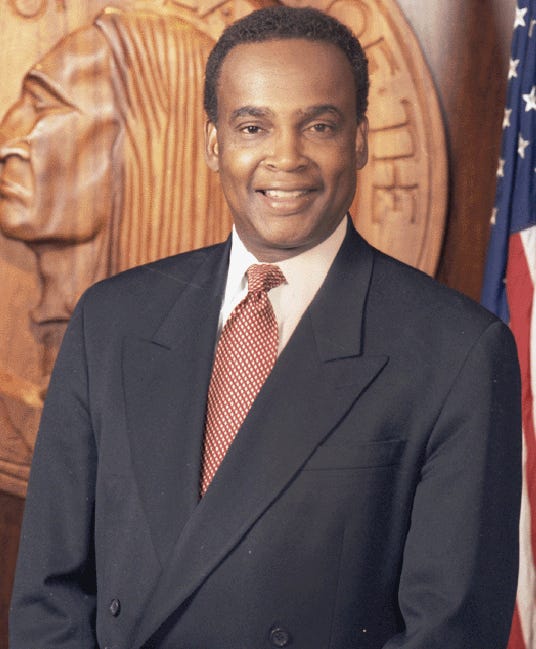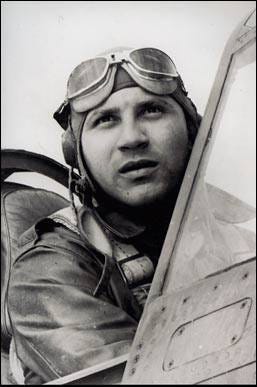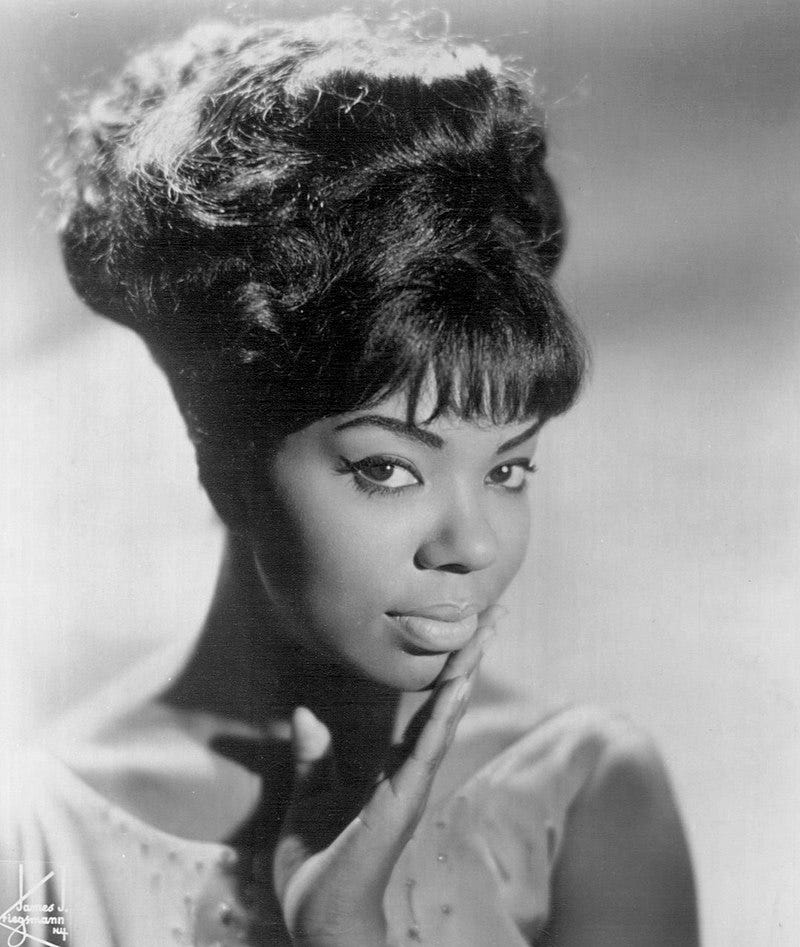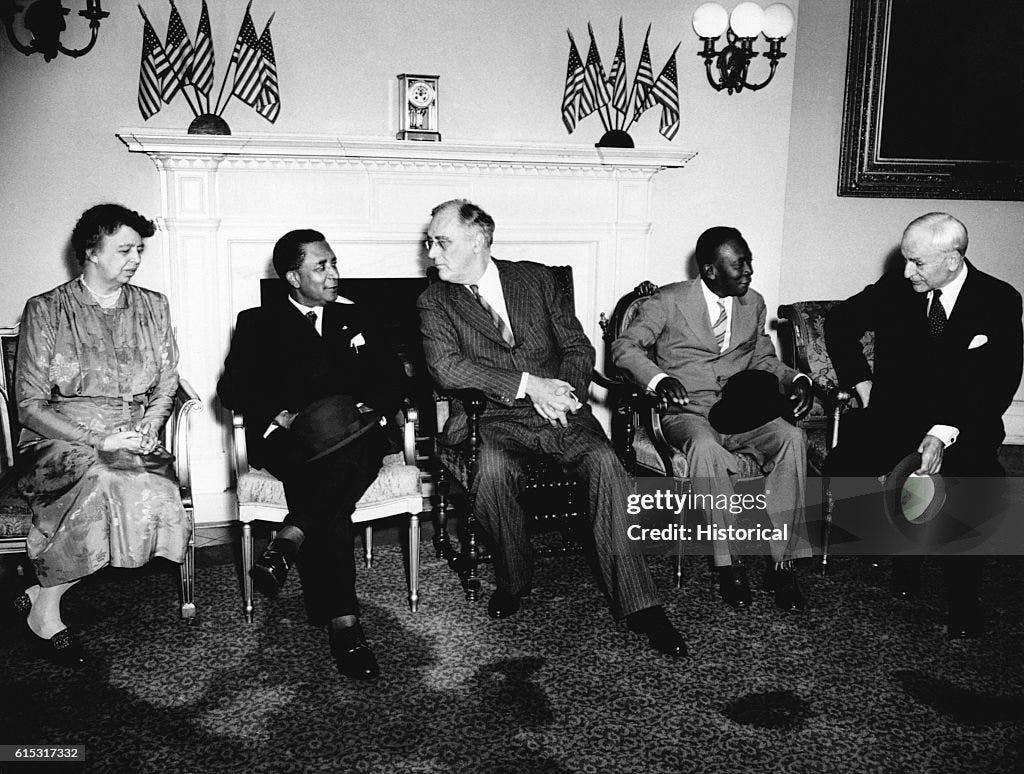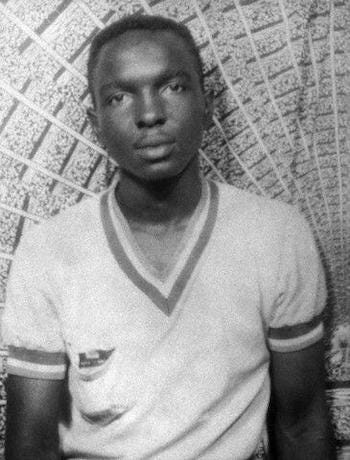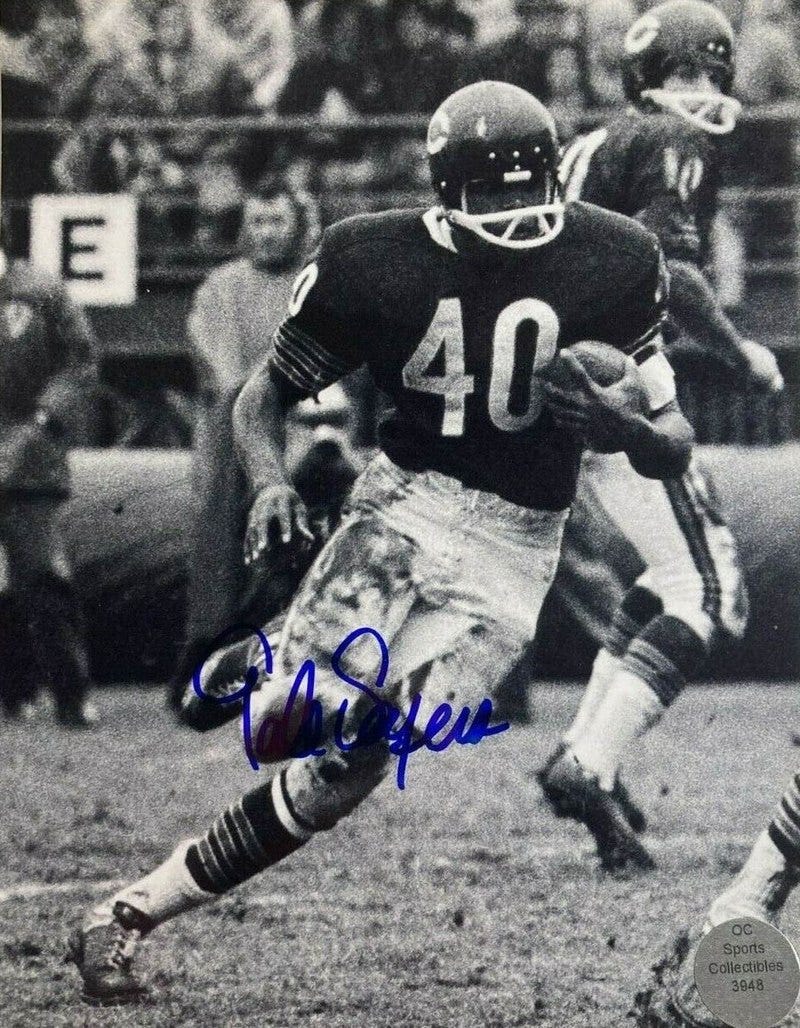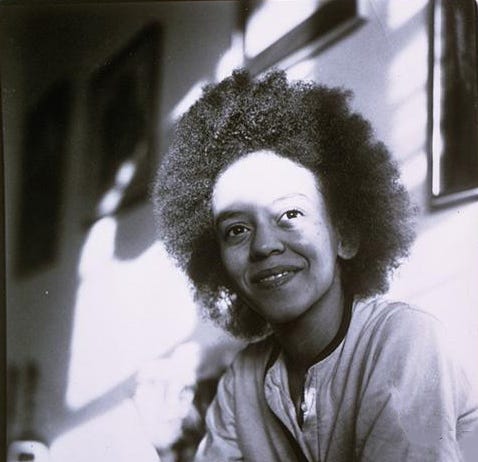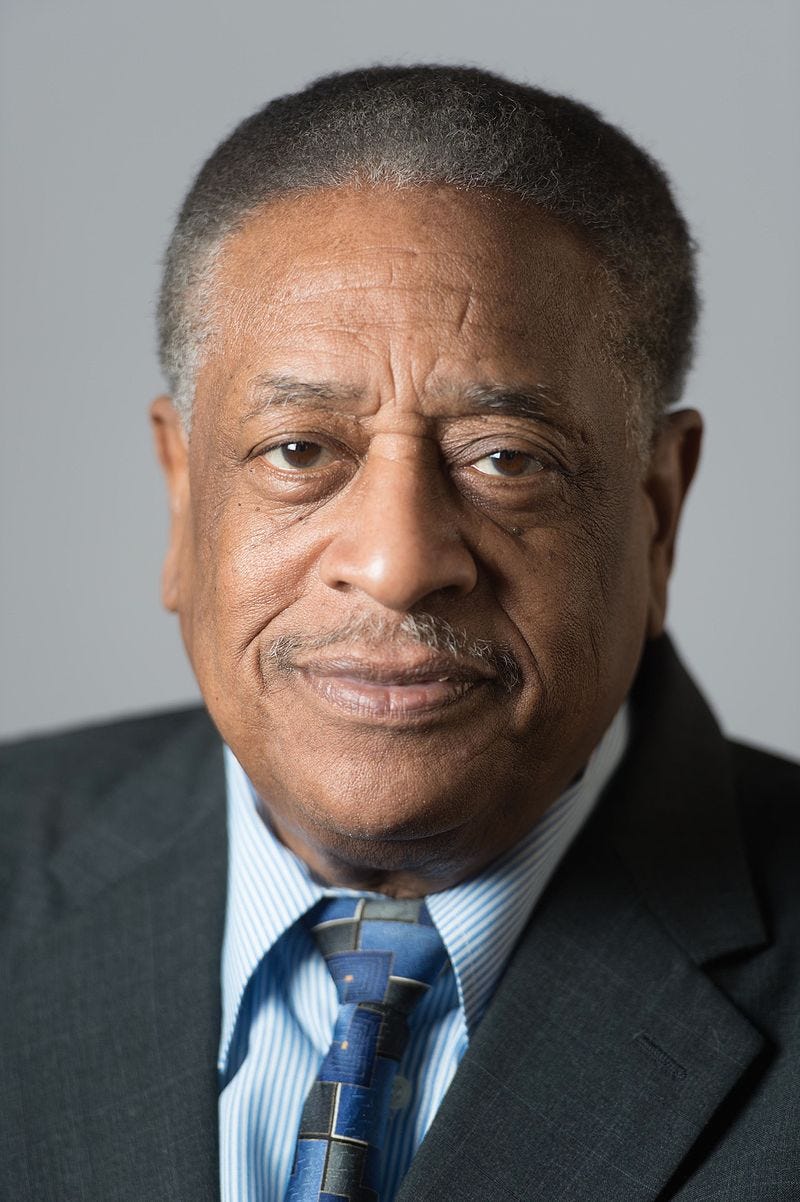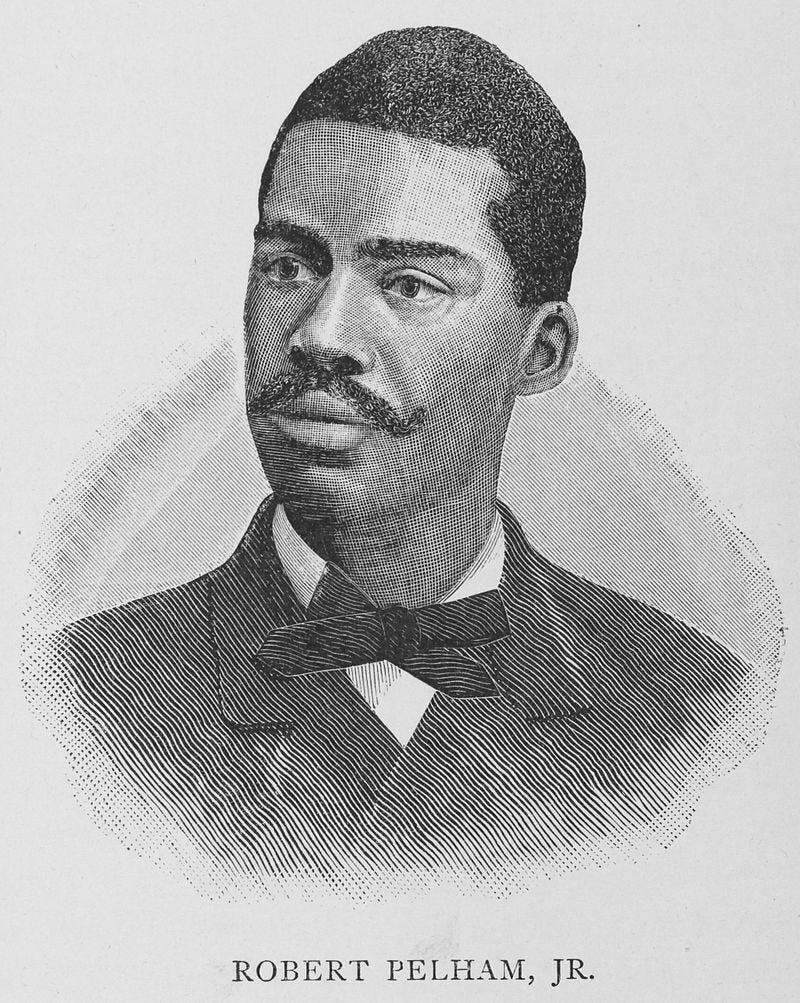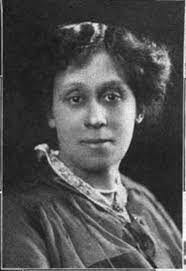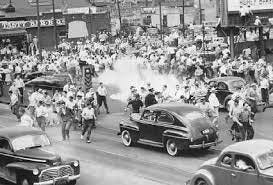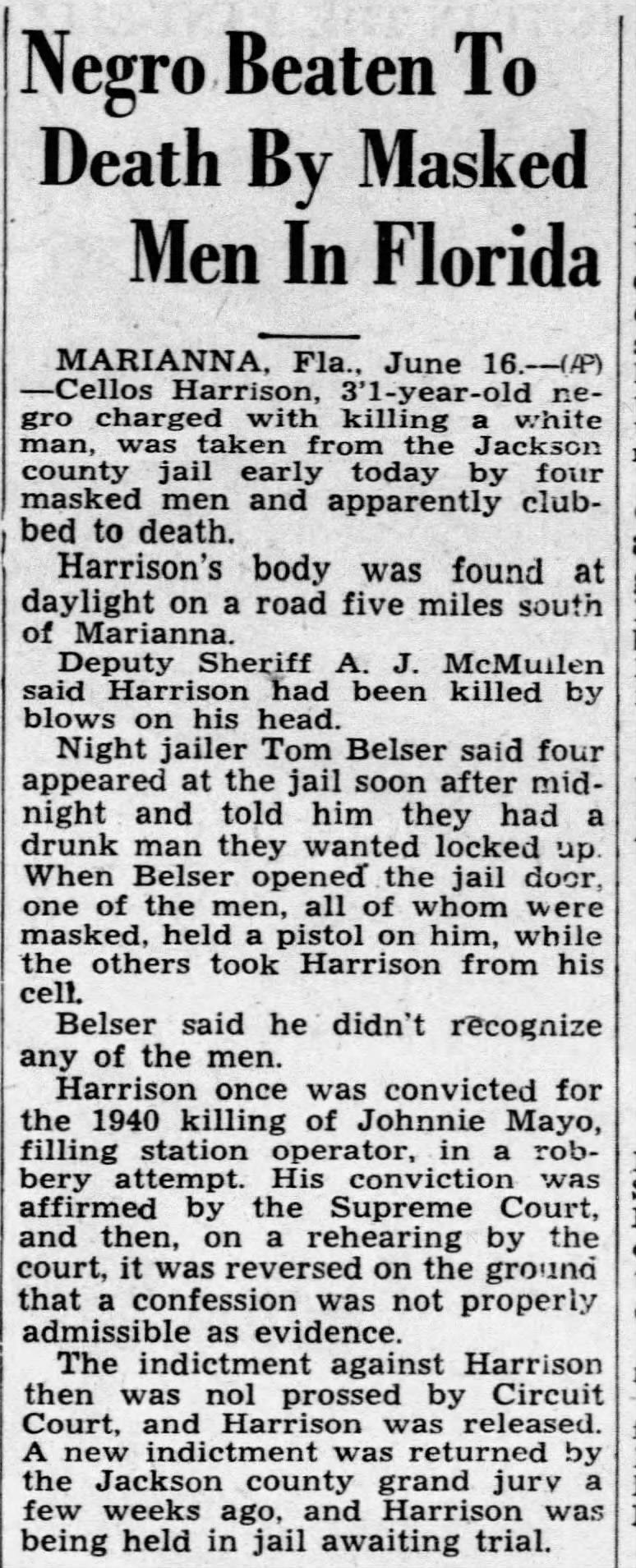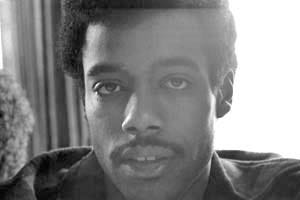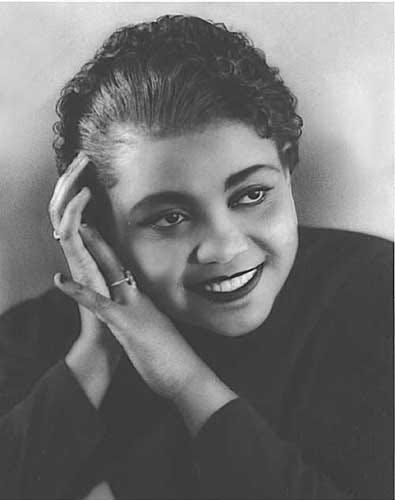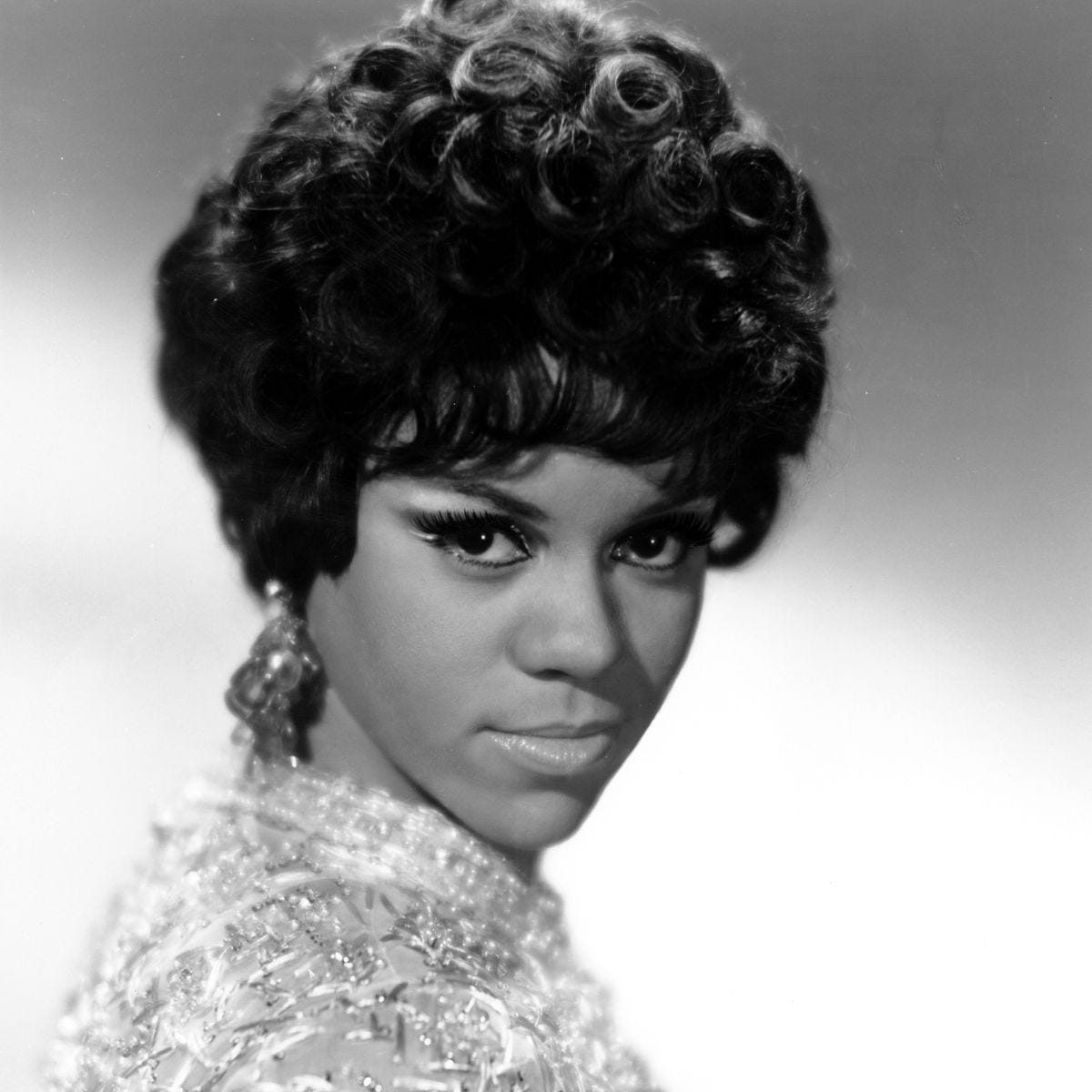1943: Amos 'n' Andy, Eddie Durham's All-Star Girl Orchestra, the 333rd Field Artillery Battalion, the 477th Fighter Group, Liberian Presidents & the Beaumont, Detroit & Zoot Suit Race Riots
Also, white male eugenicists, white male allies & influential Black Americans
Amos ‘n’ Andy was an American radio sitcom about Black characters, initially set in Chicago then later in the Harlem section of New York City.
While the show had a brief life on 1950s television with Black actors, the 1928 to 1960 radio show was created, written and voiced by two white actors, Freeman Gosden and Charles Correll, who played Amos Jones (Gosden) and Andrew Hogg Brown (Correll), as well as incidental characters.
The first sustained protest against the program found its inspiration in the December 1930 issue of Abbott's Monthly, when Bishop W. J. Walls of the African Methodist Episcopal Zion Church wrote an article sharply denouncing Amos 'n' Andy for its lower-class characterizations and “crude, repetitious, and moronic” dialogue.
The Pittsburgh Courier was the second largest Black American newspaper at the time, and publisher Robert L. Vann expanded Walls' criticism into a full-fledged protest during a six-month period in 1931.
As part of Vann's campaign, more than 700,000 Black Americans petitioned the Federal Radio Commission to complain about the racist stereotyping on the show.
Historian James N. Gregory writes that the program “became the subject of heated conflict within Black American communities” and that, while the Pittsburgh Courier campaigned against the program, “the Chicago Defender lauded the show's wholesome themes and good-natured humor,” going “so far as to feature Gosden and Correll at its annual community parade and picnic in 1931.”
This time, the NAACP mounted a formal protest almost as soon as the television version began, describing the show as “a gross libel of the Negro and distortion of the truth.”
In 1951, it released a bulletin on “Why the Amos 'n' Andy TV Show Should Be Taken Off the Air.”
It stated that the show “tends to strengthen the conclusion among uninformed and prejudiced people that Negroes are inferior, lazy, dumb, and dishonest, ... Every character” is “either a clown or a crook;” “Negro doctors are shown as quacks and thieves;” “Negro lawyers are shown as slippery cowards;” “Negro women are shown as cackling, screaming shrews;” “All Negroes are shown as dodging work of any kind;” and “Millions of white Americans see this Amos 'n' Andy picture of Negroes and think the entire race is the same.”
The show was widely repeated in syndicated reruns until 1966 when, in an unprecedented action for network television at that time, CBS finally gave in to pressure from the NAACP and the growing civil rights movement and withdrew the program.
Eddie Durham’s All-Star Girl Orchestra was a Black American all-female band started by arranger Eddie Durham in January 1942 (click on link to listen to music)
By November, the All-Stars were a part of Moe Gale's New York agency.
The group was also known as “Eddie Durham's All-Girl Band” and performed throughout the country and internationally.
The All-Stars typically had between eighteen and twenty-two members and pulled musicians from other popular bands of the time, including The Harlem Playgirls and The International Sweethearts of Rhythm.
Attorney who served as a justice of the Mississippi Supreme Court, Reuben V. Anderson, born
A minister for the St. Matthew's Episcopal Church, civil rights activist and member of the NAACP, Robert W. Bagnall, dies
The first Black American woman to run for state office in New York, Grace Campbell, dies.
She was also the first female Black American member of the Socialist Party and the Communist Party of America.
Economist who was a leader of the 1958 Katz Drug Store sit-in as a high school student, Barbara Ann Posey Jones, born.
Since 1971, she has been a professor of economics, department head, and Dean at several historically Black Colleges and Universities in the American South.
She is a past president of the National Economic Association.
In 2021, she was awarded the Suzan Shown Harjo Systemic Social Justice Award from the National Conference on Race and Ethnicity in Higher Education.
January 1, 1943: Civil rights activist, a member of the Mississippi Freedom Democratic Party, a Freedom Rider, and head of the Congress of Racial Equality in Mississippi in the 1960s, George Raymond Jr., born
January 5, 1943: Agricultural scientist and inventor who promoted alternative crops to cotton and methods to prevent soil depletion, George Washington Carver, dies.
He was one of the most prominent Black scientists of the early 20th century.
January 14, 1943: Architect and Democratic politician active in North Carolina, Harvey Gantt, born.
The first Black American student admitted to Clemson University after attending Iowa State University, Gantt graduated with honors in architecture, earned a master's at MIT, and established an architectural practice in Charlotte with a partner.
January 16, 1943: The first Black American female general officer of the United States Air Force, Marcelite J. Harris, born
January 24, 1943: Eugenicist and professor of psychology at Princeton University’s Department of Psychology and a pioneer in the field of psychometrics, Carl Brigham, dies.
He sat on the advisory council of the American Eugenics Society (today known as the Society for Biodemography and Social Biology) and his early writings heavily influenced the eugenics movement and anti-immigration legislation in the United States.
He created the SAT for The College Board.
He proclaimed the intellectual superiority of the “Nordic Race” and the inferiority of the “Alpine” (Eastern European), “Mediterranean,” and “Negro” races and argued that immigration should be carefully controlled to safeguard the “American Intelligence.”
Good riddance to this “scientific racist!”
January 26, 1943: R&B and soul singer from New Orleans, Louisiana, Jean Knight, born (click on link to listen to music)
January 26, 1943: Educator and eugenicist, Harry H. Laughlin, dies.
He served as the superintendent of the Eugenics Record Office from its inception in 1910 to its closure in 1939, and was among the most active individuals influencing American eugenics policy, especially compulsory sterilization legislation.
Good riddance to another “scientific” racist!
February 4, 1943: Jazz drummer and washboard player, Newman Taylor Baker, born (click on link to listen to music)
Newman Taylor Baker's paternal grandfather, Thomas Nelson Baker Sr., was the only former slave to receive a PhD from Yale University (1906).
February 7, 1943: Historian, educator and white male ally, Eric Foner, born.
He writes extensively on American political history, the history of freedom, the early history of the Republican Party, African American biography, the American Civil War, Reconstruction, and historiography, and has been a member of the faculty at the Columbia University Department of History since 1982.
Foner was born in New York City, New York, the son of Jewish parents, Liza, a high school art teacher, and historian Jack D. Foner, who was active in the trade union movement and the campaign for civil rights for Black Americans.
Eric Foner describes his father as his “first great teacher,” and recalls how:
deprived of his livelihood while I was growing up, he supported our family as a freelance lecturer. ... Listening to his lectures, I came to appreciate how present concerns can be illuminated by the study of the past—how the repression of the McCarthy era recalled the days of the Alien and Sedition Acts, the civil rights movement needed to be viewed in light of the great struggles of Black and white abolitionists, and in the brutal suppression of the Philippine insurrection at the turn of the century could be found the antecedents of American intervention in Vietnam. I also imbibed a way of thinking about the past in which visionaries and underdogs—Tom Paine, Wendell Phillips, Eugene V. Debs, and W. E. B. Du Bois—were as central to the historical drama as presidents and captains of industry, and how a commitment to social justice could infuse one's attitudes towards the past.
February 7, 1943: Physicist and mathematician who is the Fuller E. Callaway Professor of Physics at Clark Atlanta University, Ronald E. Mickens, born.
Mickens has had an interest in the history of science, and specifically the history of Black scientists, throughout his academic career.
He has served as the historian of the National Society of Black Physicists and has published histories of Black physicists – most notably Edward Bouchet, widely recognized as the first Black American to receive a Ph.D. in the United States – as well as biographies of Black women in science.
Mickens was also a co-founder of the National Conference of Black Physics Students and he was a member of the founding council of the Edward Bouchet Abdus Salam Institute, an organization founded in 1988 by Nobel laureate in physics Abdus Salam to encourage collaboration between African and American physicists, where he continues to serve as a council member.
Mickens' work earned him recognition by Mathematically Gifted & Black as a Black History Month 2017 Honoree.
February 8, 1943: Data scientist and inventor, Valerie Thomas, born.
She invented the illusion transmitter, for which she received a patent in 1980.
She was responsible for developing the digital media formats that image processing systems used in the early years of NASA's Landsat program.
February 14, 1943: Funk and soul jazz saxophonist, Maceo Parker, born (click on link to listen to music)
February 20, 1943: Campaigner for equality in education, Linda Carol Brown, born.
As a school-girl in 1954, Brown became the center of the landmark United States civil rights case Brown v. Board of Education.
Brown was in third grade at the time, and sought to enroll at Sumner School in Topeka, Kansas.
Her admission was denied based on her race.
Her lawsuit against segregation in elementary schools was ultimately successful and the resulting Supreme Court precedent overturned the ‘separate but equal’ doctrine which had been previously established in Plessy v. Ferguson.
Brown became an educator and civil rights advocate.
February 22, 1943: Singer and activist, Cordell Reagon, born.
He was the founding member of The Freedom Singers of the Student Nonviolent Coordinating Committee (SNCC), a leader of the Albany Movement and a Freedom Rider during the Civil Rights Movement.
February 26, 1943: Actor and film director, Bill Duke, born
March 2, 1943: Prison activist, writer, singer, and former Black Panther Party chairwoman who is based in Oakland, California, Elaine Brown, born.
Brown stepped down from chairing the Black Panther Party less than a year after Newton’s return from Cuba in 1977, when Newton refused to condemn the beating of Regina Davis, an administrator of the Panther Liberation School.
Other male members of the party beat Davis and broke her jaw because she reprimanded a coworker when he did not do an assignment.
Newton opted for solidarity with the men.
This incident was the point at which Brown could no longer tolerate the sexism and patriarchy of the Black Panther Party.
For many, Brown's leaving was seen as a turning point for the Party.
She left Oakland with her daughter, Ericka, and moved to Los Angeles.
A woman in the Black Power movement was considered, at best, irrelevant. A woman asserting herself was a pariah. If a Black woman assumed a role of leadership, she was said to be eroding Black manhood, to be hindering the progress of the Black race. She was an enemy of the Black people.... I knew I would have to muster something mighty to manage the Black Panther Party.
— From her 1992 memoir A Taste of Power
In late 2007, she resigned from the Green Party, as she found that the Party remained dominated by whites who had “no intention of using the ballot to actualize real social progress, and will aggressively repel attempts to do so.”
March 2, 1943: Educator, lawyer, judge, philanthropist, and Republican politician from the state of Arkansas, Scipio Africanus Jones, dies
March 8, 1943: Private George Watson dies attempting to rescue several soldiers from drowning at sea during World War II.
In 1997, he was awarded the Medal of Honor, the nation's highest military decoration for valor, for his actions on March 8, 1943, near Porlock Harbor, New Guinea.
Watson and six other Black Americans who served in World War II, were awarded the Medal of Honor on January 12, 1997.
The Medal of Honor was posthumously presented to Watson by President Bill Clinton on January 13, 1997, during a Medals of Honor ceremony for the seven recipients at the White House in Washington, D.C. The seven recipients are the first and only Black Americans to be awarded the Medal of Honor for World War II.
March 9, 1943: The 333rd Field Artillery Battalion was a racially segregated United States Army unit of Black American troops during World War II
March 15, 1943: Musician, songwriter, and record producer who is most famous for his role as frontman for Sly and the Family Stone, Sly Stone, born (click on link to listen to music)
March 17, 1943: Former President of Howard University, H. Patrick Swygert, born
March 29, 1943: Steward’s Mate in the United States Coast Guard, Charles Walter David Jr., dies of pneumonia after rescuing other sailors from the frigid North Atlantic
April 7, 1943: Diplomat from the United States who has served as United States Ambassador to several African nations, Johnnie Carson, born.
In 2009 he was nominated to become U.S. Assistant Secretary of State for African Affairs by President Barack Obama.
He resigned in 2013 after four years in the role and following the resignation of Secretary of State Hillary Clinton.
May 1943: The 477th Fighter Group mission was to train what would become the legendary World War II Black American aviators known as the Tuskegee Airmen with Republic P-47 Thunderbolt fighters and North American B-25 Mitchell bombers.
During World War II, continued pressure from Black American civilian leaders led the Army to let Black servicemen train as members of bomber crews, a step that opened many more skilled combat roles to them.
On May 5, 1944, possibly out of fear of a repeat of the previous summer's race riot in nearby Detroit, the 477th was abruptly relocated to Godman Field on Fort Knox in Kentucky.
The morale of the 477th was poor because the field was not suited to use by the B-25 and because Black officers, including combat veterans of the 332d Fighter Group who had transferred to the bomber unit, were not being advanced to command positions.
Colonel Benjamin O. Davis, Jr., took command on July 1, and Black officers replaced white officers in lower command and supervisory positions.
May 4, 1943: Politician who served as the 49th mayor of Seattle, Washington, Norm Rice, born.
Rice was Seattle's first elected Black American mayor.
May 9, 1943: U.S. Army Air Corps officer with the Tuskegee Airmen, and an American basketball and football player who was subject to segregation in college and professional sports, Wilmeth Sidat-Singh, dies
May 10, 1943: Dancer and choreographer, Judith Jamison, born.
She is the artistic director emerita of Alvin Ailey American Dance Theater.
May 13, 1943: Singer, who helped to define the emerging sound of Motown in the early 1960s, Mary Wells, born (click on link to listen to music)
May 24, 1943: A Vermont educator and politician who served in the Vermont House of Representatives and Vermont Senate, Francis K. Brooks, born
May 24, 1943: Graphic artist, Emory Douglas, born.
He was a member of the Black Panther Party from 1967 until the Party disbanded in the 1980s.
As a revolutionary artist and the Minister of Culture for the Black Panther Party, Douglas created iconography to represent Black American oppression.
May 25, 1943: A riot breaks out at the Alabama Dry Dock Shipping Company after 12 Black men were promoted to “highly powered” positions.
ADDSCO built and maintained U.S. Navy ships during World War I and World War II.
During World War II, the company was the largest employer in Mobile.
In 1941, the company began hiring Black men in unskilled positions.
By 1943, Mobile shipyards employed 50,000 workers and Black men and women held 7,000 of those jobs.
Though small, this increase in Black employees did not please white workers.
In the spring of 1943, in response to President Roosevelt's Fair Employment Practices Committee issuing directives to elevate Black men to skilled positions, as well as years of pressure from local Black leaders and the NAACP, ADDSCO reluctantly agreed to promote 12 Black workers to the role of welder, a position previously reserved for white employees.
Shortly after the new welders finished their first shift, an estimated 4,000 white shipyard workers and community members armed with pipes, clubs, and other dangerous weapons attacked any Black employee they could find.
Two Black men were thrown into the Mobile River by the mobs, while others jumped in to escape serious injury.
The National Guard was called to restore order; although no one was killed, more than fifty people were seriously injured, and several weeks passed before Black workers could safely return to work.
Even after the attack, many white employees remained defiant and refused to return to work unless they received a guarantee that Black people would no longer be hired.
When the federal government intervened, the company created four segregated shipways where Black people could hold any position with the exception of foreman.
Black people working on the rest of the shipyard were regulated to the low-paying, unskilled tasks they had historically performed.
May 25, 1943: Actress and singer, Leslie Uggams, born (click on link to listen to music)
May 26, 1943: Edwin Barclay, the president of the Republic of Liberia, William Tubman, Liberia's president-elect, meet with President Roosevelt, Eleanor Roosevelt, and Secretary of State Cordell Hull, at the White House.
President Edwin Barclay of Liberia, was the first African president to pay an official visit to an American president, when he arrived at the White House.
The visit was by way of returning the call made by President Roosevelt in Liberia after the famous “Unconditional Surrender” at the Casablanca Conference.
May 28, 1943: Diplomat, Ruth A. Davis, born.
Davis served as the 24th director general of the United States Foreign Service.
She is the first woman of color to be appointed as Director General of the Foreign Service and the first Black American Director of the Foreign Service Institute.
In 2002, she became a career member of the Senior Foreign Service and a Career Ambassador.
She was the Chief of Staff of the Africa Bureau of the U.S. Department of State.
May 30, 1943: Civil rights activist, James Chaney, born.
He was one of three Congress of Racial Equality (CORE) civil rights workers murdered in Philadelphia, Mississippi, by members of the Ku Klux Klan on June 21, 1964.
The others were Andrew Goodman and Michael Schwerner from New York City.
May 30, 1943: Radio show host and production director, Patrick Ellis, born
May 30, 1943: Professional football halfback and return specialist in the National Football League (NFL), Gale Sayers, born
June 3, 1943: In the Zoot Suit Riots, American servicemen and white Angelenos attacked and stripped children, teenagers, and youths who wore zoot suits, ostensibly because they considered the outfits, which were made from large amounts of fabric, to be unpatriotic during World War II.
Rationing of fabrics and certain foods was required at the time for the war effort. While most of the violence was directed toward Mexican American youth, Black American and Filipino American youths who were wearing zoot suits were also attacked.
June 7, 1943: Poet, writer, commentator, activist, and educator, Nikki Giovanni, born.
One of the world's most well-known Black American poets, her work includes poetry anthologies, poetry recordings, and nonfiction essays, and covers topics ranging from race and social issues to children's literature.
She has won numerous awards, including the Langston Hughes Medal and the NAACP Image Award.
She has been nominated for a Grammy Award for her poetry album, The Nikki Giovanni Poetry Collection.
Additionally, she has been named as one of Oprah Winfrey's 25 “Living Legends.”
June 9, 1943: Biblical scholar, serving as professor of New Testament language and literature and editor of The Journal of Religious Thought at the Howard University School of Divinity, Cain Hope Felder, born
June 12, 1943: Journalist and civil servant, Robert Pelham Jr., dies.
Along with his brother, Benjamin, and others, he was a founder and editor of the Detroit Plaindealer in 1883.
He served in a number of public positions in Michigan, and later worked at the United States Census in Washington, D.C.
In Washington, he continued to work as a journalist, and late in his life edited the weekly paper, Washington Tribune.
He was also a member of a number of civil rights organizations, including the National Afro-American League, the American Negro Academy, and the Spingarn Medal Commission.
June 14, 1943: Teacher and a Young Women's Christian Association organizer in New York City, Eva del Vakia Bowles, dies.
When she began working at the New York City segregated YWCA in Harlem, she became the first Black woman to be a general secretary of the organization.
For eighteen years she organized Black branches of the YWCA and expanded their services to community members.
She received recognition from former president Theodore Roosevelt for her work during World War I on behalf of the segregated Y.
June 15, 1943: Beaumont race riot related to wartime tensions in the overcrowded city, which had been flooded by workers from across the South.
The immediate catalyst to white workers from the Pennsylvania Shipyard in Beaumont attacking black people and their property was a rumor that a white woman had been raped by a Black man.
This was one of several riots in the summer of 1943 in which Black people suffered disproportionately as victims and had the greatest losses in property damage.
June 16, 1943: Cellos Harrison, a farm worker is lynched after being convicted of killing gas station attendant Johnnie Mayo in 1940.
His conviction was overturned when his confession was thrown out on appeal.
Cellos was reindicted and then taken from the Jackson County, Florida jail by four masked men and killed by a blow or blows to the head.
His body was found 5 miles outside Marianna.
State and federal investigations were launched into the lynching, but no one was ever indicted or convicted.
A decade earlier, Claude Neal was lynched in Marianna.
The area was also wrought by a wave of violence against Black Americans and Republicans during the Reconstruction Era after the American Civil War in what is known as the Jackson County War.
NAACP lawyer Harry T. Moore, who was later assassinated in a 1951 bombing of his home, wrote a letter to Florida governor Spessard Holland calling for an investigation and one was ordered.
Tameka Bradley Hobbs wrote about this and three other lynchings in her 2015 book Democracy Abroad, Lynching at Home: Racial Violence in Florida.
June 20, 1943: The Detroit race riot occurred in a period of dramatic population increase and social tensions associated with the military buildup of U.S. participation in World War II, as Detroit's automotive industry was converted to the war effort.
Existing social tensions and housing shortages were exacerbated by racist feelings about the arrival of nearly 400,000 migrants, both Black American and white Southerners, from the Southeastern United States between 1941 and 1943.
The migrants competed for space and jobs against the city's residents as well as against European immigrants and their descendants.
The riot escalated after a false rumor spread that a mob of whites had thrown a Black mother and her baby into the Detroit River.
Blacks looted and destroyed white property as retaliation.
Whites overran Woodward to Veron where they proceeded to violently attack Black community members and tip over 20 cars that belonged to Black families.
June 22, 1943: Suffragist, race and gender activist, writer, political organizer, and educator, Addie Waites Hunton, dies.
In 1889, Hunton became the first Black woman to graduate from Spencerian College of Commerce.
She worked for the Young Women's Christian Association (YWCA), served as the national organizer for the National Association of Colored Women (NACW) from 1906 to 1910, and served in the U.S. Army during World War I.
Hunton was a regular participant in the work of the Equal Suffrage League.
June 23, 1943: Journalist, professor, and former activist with the Student Nonviolent Coordinating Committee (SNCC), Charles E. Cobb Jr., born in Springfield, Massachusetts.
Along with several veterans of SNCC, Cobb established and operated the Black American bookstore Drum and Spear in Washington, D.C., from 1968 to 1974.
Currently, he is a senior analyst at allAfrica.com and a visiting professor at Brown University.
June 26, 1943: Operatic soprano, Ruby Elzy, dies (click on link to listen to music)
June 30, 1943: Singer and a founding member of the Motown vocal female group the Supremes, Florence Ballard, born (click on link to listen to music)




